A dignified life for sanitary workers envisaged
by Ranil Wijayapala
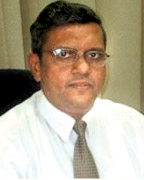
Priyantha Samarakkody |
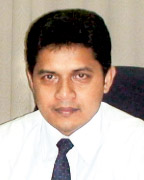
Nalin Mannaperuma |
In the good old days cleaning jobs were for the untouchables and
their presence at one’s door step was considered a bad omen. But the
so-called elite needed their service on a regular basis to lead
dignified lives in a clean environment at the expense of those cleaners
who were bound to serve them, keeping their dignity aside.
With changes in society, from feudalism to capitalism, have we seen
any positive development in the lives of those waste collectors and
sanitary workers? The common perception of society is that these
sanitary workers should be poor, drug addicted, unhealthy and unclean.
Should this be their destiny? No. They should be given due
recognition for the key role played to keep the environment clean and
healthy at a time waste management has become one of the most
challenging tasks across the globe.
Industrialisation, development activities and the increasing
population has made this occupation more complex, going beyond its
traditional role of collecting and dumping, requiring authorities to
empower these workers to live up to current developments and trends in
the world.
The gravity of the issue must consider the 3,500 metric tonnes of
garbage collected on a daily basis from the Western Province (WP) which
is home to the majority of industries with more than 30 percent of the
country’s population generating more than 60 percent of the solid waste
generated from the entire country.
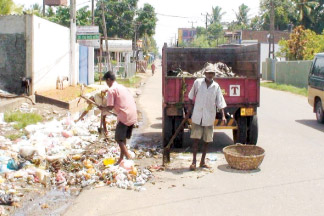
Our barefoot sanitary workers |
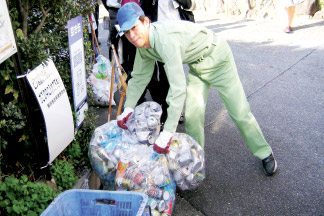
This is what is envisaged from Parisara Mithuro |
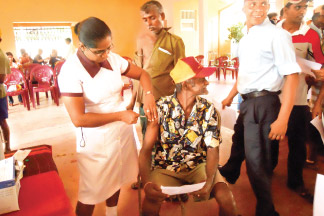 |
| A worker being
injected at a health camp |
According to the Waste Management Authority (WMA) which is the apex
body in the WP to coordinate and supervise solid waste management in
local bodies in the province, the 48 local government bodies in the WP
spend more than Rs.1.5 billion annually to manage the solid waste
collected from the province.
More than 5,000 sanitary workers, with 450 tractors and vehicles
along with 150 contractors on a daily basis attend to the solid waste,
spending more than Rs.1.5 billion as direct and indirect expenses to
keep the province free of garbage.
“The WP WMA after studying the waste management process within the
province developed a strategy along with national policies on waste
management,” said Deputy Director, Technology of the WMA Nalin
Mannaperuma.
The seven steps on municipal waste management is a strategy
introduced as a mechanism to streamline the improper handling of
municipal solid waste in all local authorities in the province.
Seven step strategy
The seven steps of the strategy are separation of waste at source,
proper waste collection, cleaning of roads and public places, avoiding
of open waste storages/bins or providing of appropriate waste receptors
at public places, proper waste transportation, utilising of waste as a
resource and environmental friendly final disposal of refused garbage.
“To implement the strategy the WMA is conducting different types of
programs at provincial and local authority levels. Based on the scale
and the targeted objective there are four major types of programs - mass
scale, medium scale, small scale community based programs and awareness
programs”, he said.
The small scale projects are aimed at separation of garbage at its
sources and transportation and collection of garbage. The medium and
mass scale programs are aimed at using the garbage as resource for
composting and for recycling.
The objective of the medium and mass scale waste management program
is to provide infrastructure facilities to activate steps number six and
seven of the strategy. The mass scale and medium scale composting
facilities are two major programs that are being activated by the WMA.
The WMA has initiated a five-year action plan aiming to channel more
than 50 percent of the solid waste for composting and more than 75
percent of the collected polythene and plastic for recycling.
At present Medium and Mass scale composting facilities are highly
popular among the local authorities of the WP due to its low operational
and maintenance cost and also simplicity of operation.
Currently, out of the 48 local authorities, 20 operate medium and
mass scale composting facilities in the province.
The total capacity of the facilities is around 200 Mt of garbage per
day ie around 10 to 15 percent of the perishable waste generated within
the province.
According to the five-year action plan 2009 to 2014 WMA is envisaging
handling of 1000 Mt of perishable garbage by expansion, upgrading of
existing facilities and initiating of new composting facilities within
the province by the end of 2014.
“If we are to reach these targets we have to empower the employees
engaged in the small and medium scale projects”, he said.
According to Mannapperuma, in the medium and mass scale projects a
large number of workers are directly involved. Out of the 5,000 workers
1,300 work in the medium scale composting sites within the province and
more than 3,700 in the collection of garbage in tractors and other
vehicles.
The poor living standards, economic level and education level of
these workers has posed a challenge for the WMA to go ahead with its
seven-step strategy.
The WMA initiated the Parisara Mithuro program in 2007 under the
instructions of the WP Chief Minster, Mannapperuma said.
Parisara Mithuro aims to provide a proper knowledge of garbage as the
workers are exposed to health hazards. “They should be provided with
uniforms and protective wear to make sure that their health will not be
affected.
Some do not use the protective wear though they have been provided
with these. We have to educate them on the importance of wearing them.
Last year we conducted a program with the Dangerous Drugs Control Board
to educate these workers from getting addicted to alcohol”, he said.
“This year’s theme is to free sanitary workers from TB. We conducted
an awareness campaign conducted health camps to screen them for diseases
and provide medication free of charge”, Mannaperuma said.
Waste collectors and those who transport collected garbage undergo
this process annually. Workers at the composting sites will be subjected
to the program this year.
Sanitation and productivity
Parisara Mithuro 2011, theme is ‘Better Sanitation for better
productivity’. The program will be launched on June 28 at the
Pohorawatta composting site in Kalutara which was initiated by the
Pilisaru program of the CEA under the directive of the Environment
Ministry.
To start off the project WMA selected two local authorities Kalutara
UC and Kalutara PS. 140 sanitary labourers will be the target group of
the program.
The International Labour Organisation (ILO) has joined hands with the
WMA to empower these sanitary workers to achieve new vistas in their
profession and to bring dignity and pride to their job.
ILO National Program Officer for Green Jobs, Shyama Salgado said the
objective of joining hands with WMA is to introduce a decent work
concept into green jobs that support environmentally friendly
interventions.
“For example in waste management, we empower waste collectors, to
work confidently in cleaning the environment. ILO’s aim is to support
the WMA to do a value change analysis to ensure that decent work
deficits are filled for those workers,” she said.
“Most waste collectors are in the informal sector. They don’t have a
formalised structure and freedom to form into groups that give them
strength in numbers. Their status does not support collective
bargaining.”
“We do believe in collective bargaining, an important part of the
decent worker concept. Social protection, social security, EPF, ETF
health insurance, zero tolerance on adult hazardous work, bringing
personnel protective equipment, they have to have dialogue among them to
have a voice for their rights,” she said.
The composting site at Pohorawatta Kalutara has been identified to
launch this program. We have lot to do. We are not working in the whole
WP but at composting sites,” Salgado said.
“On June 28, we will have elements of career guidance and
occupational safety brought in as they are two important elements for
decent work,” she said.
The head of the Colombo University Career Guidance Unit, will
initiate participatory sessions with about 100 sanitary workers. A
representative from the National Institute for Occupational Safety under
the Ministry of Labour will be teaching them occupational safety and
health issues on waste management sites.
“They need to be aware what work is hazardous, what work is zero
tolerance and what work can be done wearing protective equipment and
empowering themselves to work in a sector that can be difficult and
dangerous,” she said.
Chief Minister WP Prasanna Ranatunga, Labour Ministry officials,
political leaders from the Kalutara area, ILO Country director for Sri
Lanka and Maldives, will participate at the launch.
Director of the WMA Dr. Samarakkody said “the WMA will continue
training programs for supervisory cadres and zonal officers to monitor
the improvements which will be introduced through this project.” At the
moment we are concentrating on the workers who are directly under local
government.
That will be extended to cover the private sector too.
“We had positive improvement in the living standards of the labourers
in the Karadiyana dumping and composting site through our earlier
program. Those workers now come to the site on motorbikes or three
wheelers and earn some times Rs. 50,000 per month. They are well off
now.”
“An objective of the exercise is to ensure the labourers are accepted
and respected by all stakeholders, the key to which is that the
labourers themselves have a sense of dignity and pride in the jobs they
performing,” he said.
The sanitary labourer’s job has greater potential for well paid
migrant work that fall into the semi skilled category of work.
The Learn Asia organisation is working with the WMA to develop a
curriculum so that sanitary workers can be trained on international
standards preparing them to further their career and thereby improving
their earning capacity impacting on better quality of life through
decent work opportunities,” Dr. Samarakkody said. |

